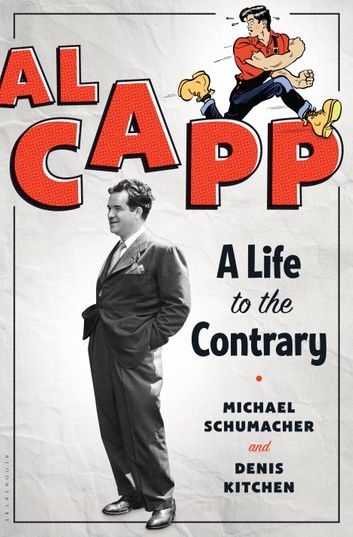| FindBook |
有 1 項符合
Al Capp的圖書 |
 |
Al Capp 作者:Denis Kitchen,Michael Schumacher 出版社:Bloomsbury Publishing 出版日期:2013-02-26 語言:英文 |
| 圖書館借閱 |
| 國家圖書館 | 全國圖書書目資訊網 | 國立公共資訊圖書館 | 電子書服務平台 | MetaCat 跨館整合查詢 |
| 臺北市立圖書館 | 新北市立圖書館 | 基隆市公共圖書館 | 桃園市立圖書館 | 新竹縣公共圖書館 |
| 苗栗縣立圖書館 | 臺中市立圖書館 | 彰化縣公共圖書館 | 南投縣文化局 | 雲林縣公共圖書館 |
| 嘉義縣圖書館 | 臺南市立圖書館 | 高雄市立圖書館 | 屏東縣公共圖書館 | 宜蘭縣公共圖書館 |
| 花蓮縣文化局 | 臺東縣文化處 |
|
|
More than thirty years have passed since Al Capp's death, and he may no longer be a household name. But at the height of his career, his groundbreaking comic strip, Li'l Abner, reached ninety million readers. The strip ran for forty-three years, spawned two movies and a Broadway musical, and originated such expressions as "hogwash" and "double-whammy." Capp himself was a familiar personality on TV and radio; as a satirist, he was frequently compared to Mark Twain.
Though Li'l Abner brought millions joy, the man behind the strip was a complicated and often unpleasant person. A childhood accident cost him a leg-leading him to art as a means of distinguishing himself. His apprenticeship with Ham Fisher, creator of Joe Palooka, started a twenty-year feud that ended in Fisher's suicide. Capp enjoyed outsized publicity for a cartoonist, but his status abetted sexual misconduct and protected him from the severest repercussions. Late in life, his politics became extremely conservative; he counted Richard Nixon as a friend,and his gift for satire was redirected at targets like John Lennon, Joan Baez, and anti-war protesters on campuses across the country.
With unprecedented access to Capp's archives and a wealth of new material, Michael Schumacher and Denis Kitchen have written a probing biography. Capp's story is one of incredible highs and lows, of popularity and villainy, of success and failure-told here with authority and heart.
|











